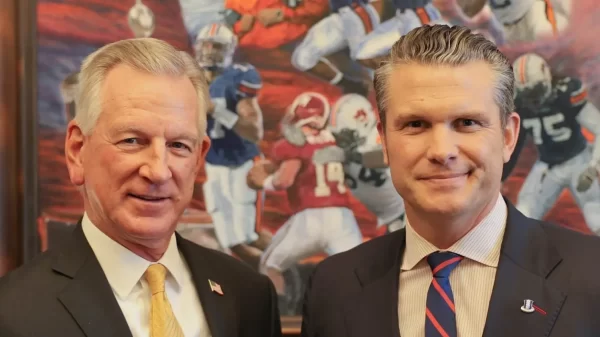In the late-2000s, Scot Dannen, the general manager of a Coleman Worldwide Moving facility in Colorado Springs, Co., was approached by one of the company’s truck drivers and asked an odd question.
The driver wanted to know where Dannen’s “weight crate” was located, according to testimony Dannen provided under oath in a deposition.
Dannen was confused. He had no idea what a “weight crate” was. When he asked the driver to explain, he “looked at me like I was from outer Mars.”
The driver then explained that a “weight crate” was a heavy crate — usually filled with something like bricks — that drivers would place on their trucks prior to a final weighing. That crate would “bump” the weight up hundreds, if not thousands, of pounds, allowing for Coleman Worldwide to bill more and for the drivers to earn more.
Dannen would learn over the next couple of years, from various drivers, that it was one of many common practices used by drivers and the company to falsify weights, and it was one piece of what the federal government deemed a nationwide “weight bumping” scam that netted Coleman Worldwide millions of dollars in fraudulent gains over the course of several years.
The “weight bumping” scam, and the resulting whistleblower lawsuits, federal lawsuits and criminal charges, has been a hot topic of late in Alabama, where Coleman Worldwide is headquartered and where Jeff Coleman, the company’s top executive, is running for Congress.
It is a district with a heavy military presence, and as such, Coleman’s opponents in the race have made the company’s legal trouble, which were settled in 2015, without much fanfare or press attention, a centerpiece of the race.
Coleman has not handled the renewed media attention of the case very well. Beginning with a Republican Women’s meeting in Coffee County last week, he began insisting that his company did nothing wrong but was instead the victim of overzealous prosecution by the Obama administration.
“That was meritless, our people did nothing wrong,” Coleman said, almost shouting into a microphone at the meeting of mostly elderly attendees. “It was a meritless, frivolous case that had no merit whatsoever. We were hit by the United States government and an Obama U.S. attorney and it was wrong. And we’ve got to do everything we can to protect this country against that sort of activity.”
It was a curious response, given that Coleman Worldwide agreed to a settlement of $5 million and one of its top managers went to prison for his role in falsifying the weights. Clearly, the company did something wrong and there was some merit to the government’s case.
Coleman was provided an opportunity by APR to answer specific questions about the case. A list of detailed questions was sent to his campaign, at Coleman’s direction, and he was told that APR was open to interview with him or it would accept answers to those questions. Coleman asked if this story, which was scheduled to run on Tuesday, could be held for a day in order for him to have time to fully answer the questions. No answers were ever provided.
What makes Coleman’s defense, and the defense his campaign is using of late — that there was no wrongdoing and it was just Obama going after an innocent company — essentially challenges the public, the media and his political opponents to delve into the facts and read more about this grave injustice.
The problem is, what they will all find is a mountain of evidence, most of which was collected by the government and backed up with emails, documents, witness statements and under-oath testimony, that shows Coleman Worldwide did a lot wrong.
APR spent the past several days combing through the many legal filings associated with the multiple whistleblower complaints against Coleman Worldwide. In addition, APR received related documents and transcripts from sources close to the legal proceedings. All of them showed a pattern of systemic fraud that spanned the country and was reported numerous times to company officials, including Jeff Coleman and other Coleman family members.
46-Coleman USA Response to Motion to Dismiss
224-Coleman Memo in Opp to MSJ
62-Coleman Transcript of Hearing
How it Worked
To understand the allegations and evidence against Coleman Worldwide, it helps to first have a bit of knowledge about just what the company does, in terms of its contract work for the U.S. military and Department of Defense.
Every year, the military will move thousands of active servicemembers all around the country, transferring them from base to base for a variety of reasons. Those service members, many of whom are married with families, have to pack up belongings and take them along.
That’s where moving companies, like Coleman Worldwide, come in. Coleman agrees to make those shipments for the government-set reimbursement rates set by the federal government. It bills the government per pound, and it determines those pounds through a series of weight checks.
To simplify things, the weight checks basically work like this: The empty Coleman truck or container, without the servicemembers’ household goods, is weighed. Then the same truck or container is weighed after the goods are packed for the move. The difference between the first weight, or “tare weight,” and the second weight is the number of pounds for which Coleman Worldwide bills the Department of Defense.
Once that weight is determined, it is written on a weight certificate. Using the weight certificate, the business office at Coleman Worldwide creates an invoice for which it bills the DoD. Additionally, a locator card is created for use by the warehouse where the servicemembers’ belongings are stored while waiting on shipment. The locator card also contains the original weight recorded.
The Alleged Fraud
The government and various witnesses allege that Coleman Worldwide used a variety of schemes to inflate the weights for which they billed the DoD. At the facility, weight certificates would be removed and replaced, or the original weights would be “whited-out” and rewritten on the forms or the tare weights would be altered.
Outside of the facilities, truck drivers would inflate weights through methods of their own. They could either pack on extra weight, falsify the original tare weight, add people to the truck, add fuel or add bogus, heavy crates, among other methods.
Among the findings documented in various court filings:
- A forensic accountant and investigator, working with the U.S. attorney’s office in South Carolina was able to identify more than 2,500 instances of false claims submitted by Coleman Worldwide in a three-year span.
- Two employees at Coleman Worldwide’s Augusta, Ga., facility reported that managers there routinely falsified weight tickets, allowing the company to over-bill the government for moving U.S. military service members’ household goods.
Coleman Exhibit Y–Missing Furniture
Coleman Exhibit P–Elmer and Mario
Coleman Exhibit G–Bumping weights
Coleman Exhibit F–False Tickets
- The testimony of those two employees was supported by an audit of the Augusta facility that was carried out by the federal government. That audit discovered more than 400 instances of weight tickets failing to match their original weight cards, indicating that they had been falsified later.
- At a facility in Hawaii, military officials became suspicious of Coleman Worldwide shipping weights after complaints from service members. A re-weigh of every Coleman Worldwide shipment — more than 600 in all — found that over 80 percent had incorrect weights on their weight tags, all of them higher, allowing the company to over-bill the U.S. government.
- In a separate whistleblower lawsuit that was later folded into the original complaint, a truck driver from North Carolina testified that he was trained how to manipulate truck weights, including leaving the back wheels just off the scales, hiding workers in the truck, filling up with fuel when going to get the load weight and adding “weight crates.”
- In Colorado, Dannen said the mis-weighs were a common and ongoing problem — so much so that his workers began checking suspicious weights constantly. In one instance, a shipment arrived that was more than 6,500 pounds short. He alerted company officials, who told him to make the delivery and let it go.
- Independent truck driver/owner Chad Holsteen, a former Army Ranger, testified that he experienced “bumped weights” at Coleman Worldwide facilities all across the U.S., specifically naming San Diego, Killeen and El Paso, Tx., Fayetteville, N.C., Augusta, and Woodbridge, Va. Because he had to pay workers to load the shipments, he routinely had to pay out of his own pocket to cover the mis-weighs. Holsteen reported these issues to company executives, including vice-president Andy Coleman, who provided Holsteen with fuel cards and other payments to “placate” him.
The Outcome
A federal judge in South Carolina eventually determined that he would allow only the evidence from the original whistleblower complaint related to the Augusta facility. That was a major blow to prosecutors hoping to present to a jury a case outlining a national pattern of fraud and seek a larger verdict — somewhere in the nine-figure range — against Coleman Worldwide.
As it was, the government agreed to settle the case for a mere $5 million and sought prosecution of just one Coleman Worldwide employee, despite an abundance of evidence and testimony that implicated dozens more in the fraud.
“Fraud on the government is high priority in this office,” U.S. Attorney Bill Nettles said after the settlement. “Monies paid to Covan (which is a subsidiary of Coleman Worldwide) for inflated weights could have been used for the benefit of our servicemembers.”
The original whistleblowers, Mario and Elmer Figueroa, a father and son who worked at the Augusta facility, received $1.25 million of that money for coming forward. During a deposition in the case, the elder Figueroa said he and his son feared losing their legal immigration status in the U.S. if they participated in the fraud.
More Evidence
The depositions of Coleman Worldwide employees during the case were particularly unfavorable to the company. Numerous employees cited specific examples of fraud that they witnessed firsthand, providing the government with specific details that allowed investigators to also collect documents and other evidence. For example, a billing clerk at the Augusta location backed up the Figueroas’ claims, and helped investigators locate additional evidence.
Part of that evidence, according to a filing in the case, were the locator cards used by the Augusta facility. Those cards were filed at the facility and didn’t accompany the servicemembers’ shipments. So, unlike the weight certificates, they were never altered. When investigators recovered the locator cards and then matched them to weight certificates for the shipments sent by the facility, they discovered the weights on more than 400 of them didn’t match.
In another odd twist, as investigators were combing through evidence, they discovered that a manager at the Coleman Worldwide facility in Fayetteville, N.C., had quietly attempted to repay the Department of Defense for six shipments. After a number of court hearings, the company admitted that it had conducted an audit of its recent shipments — 24 in all — and the court ordered the results turned over to the government.
That company-conducted audit, according to a court filing, found that 10 of the 24 shipments had been weight-bumped, including four shipments that were off by more than 1,300 pounds and one that was off by more than 2,700 pounds.
Some managers and other high-level employees for Coleman Worldwide refused to answer questions during their depositions, choosing instead to invoke their Fifth Amendment rights against self-incrimination. In a brief filed in the case, the government accused other managers and top-level executives of lying and of having very fortunate “lapses in memory.”
The government also accused Coleman Worldwide officials and attorneys of refusing to follow the rules of discovery and dumping massive amounts of documents on prosecutors, in some instances several years after they requested.
Executive Knowledge
However, those prosecutors did manage to dig out a number of emails that show corporate executives, including Jeff Coleman, were alerted multiple times of instances of shipping weights being inflated or outright fraud occurring. But there were no emails indicating that corporate executives, including Coleman, had directed the fraud.
Instead, prosecutors alleged that executives passively encouraged the fraud by establishing a pay-by-weight system that rewarded employees at every level for “bumping weights” and had almost no checks to ensure fraud didn’t occur. In fact, some employees testified in depositions that the practice was so common that they were trained by managers on how to increase weights improperly.
One of those managers, Ronald Niemi, who worked at Coleman Worldwide’s Augusta facility, was convicted of fraud in 2015 and sentenced to 5 months in prison. He also had to repay more than $22,000 for 40 false weight certificates he altered.
Despite the numerous witnesses and documents outlining alleged fraud occurring at Coleman Worldwide facilities across the country, Niemi was the only employee charged criminally and the U.S. government dropped the case against Coleman Worldwide following the $5 million settlement.






















































